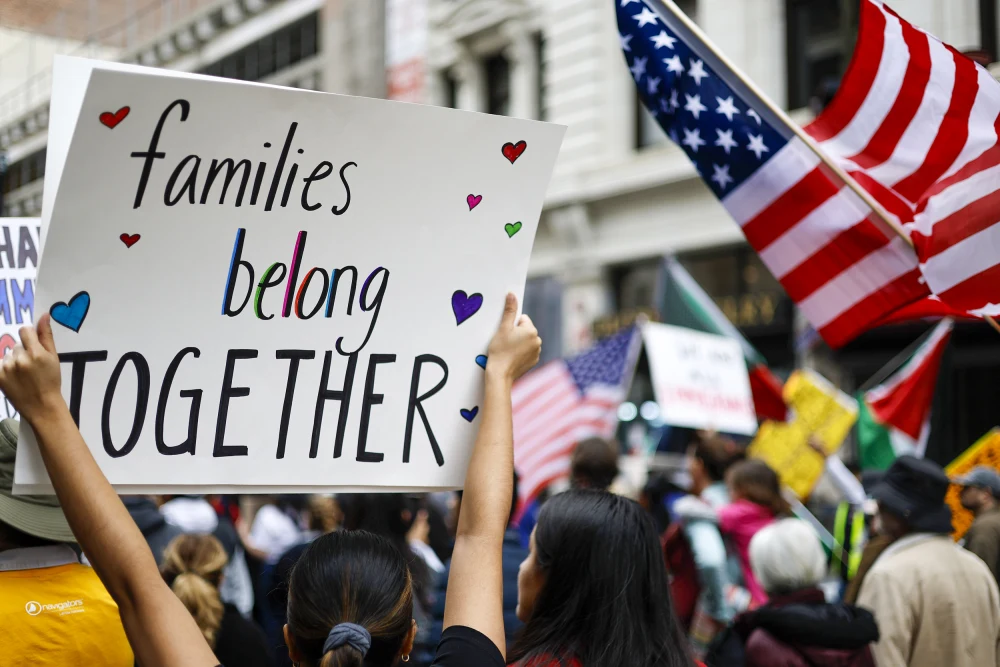As Trump pledges mass deportation, he’s creating more undocumented people

Content Index
Florndjie Camey, 31, came to the U.S. from Haiti full of hope. She had entered legally under a government program, found a job as a cashier in Miami, and began building a better future for herself and her young daughter. But now, everything has changed.
Former President Donald Trump has declared that Camey—and over a million others—no longer have legal permission to stay in the U.S. He plans to carry out the largest mass deportation in U.S. history and has targeted the very program that allowed Camey to come legally. His administration claims the Biden-era humanitarian parole programs, including the one Camey used, were unlawful.

Instead of focusing on undocumented immigrants who entered the country illegally, critics say Trump is turning legally documented people into undocumented ones, creating a bigger pool for deportation.
Angela Kelley, a former advisor in the Department of Homeland Security, put it this way: “Trump is taking away legal status from people, making them undocumented, and then targeting them for deportation. It’s a self-fulfilling prophecy.”
You may also like
Judge Rules Google Illegally Built Monopoly in Digital Ad Market
Karen Tumlin of the Justice Action Center added, “This move strips work authorization from people early and increases the number of those at risk of being deported.”
On May 30, the U.S. Supreme Court sided with Trump, allowing his administration to revoke legal status and work permits for over 500,000 people from Cuba, Haiti, Nicaragua, and Venezuela, all of whom entered through the CHNV parole program. Homeland Security Secretary Kristi Noem has since ordered them to “self-deport” immediately.
Guerline Jozef of the Haitian Bridge Alliance said the decision has crushed those who trusted the U.S. government and followed the rules. “They’re having the rug pulled out from under them,” she said.
You may also like
The perfect social media various is old-school running a blog
The Trump administration argues the parole programs didn’t do enough for border security and were too lenient, claiming they were misused and filled with fraud. Critics disagree and accuse Trump of using these claims to justify mass deportation.
In cities across the country, protests have erupted as people rally against the return of harsh immigration raids and policies.

Little Help for Those Who Want to Stay Legally
Trump’s critics also say he hasn’t provided enough legal paths for immigrants who want to stay in the U.S. and work. Many industries, like farming and hospitality, are calling for more visas to fill job shortages. But instead of offering more options, the Trump administration has made things harder—even banning visas from certain countries and tightening rules for students and workers.
You may also like
A Stress-Free Delivery: What to Pack in Your Maternity Hospital Bag
Stuart Anderson, who leads the National Foundation for American Policy, said: “There’s been no effort to improve legal pathways. If anything, it’s gotten worse.”
One example: Trump’s team has paused and then reversed a decision to stop immigration raids targeting workers in sectors like agriculture—even if employers vouched for them.
Camey’s Journey: A Second Chance Now at Risk
Back in Haiti, Camey had been studying psychology and helping troubled youth, but life was incredibly hard. In her small town of Fort Liberté, jobs were scarce, and gang violence was spreading. “There was no future,” she said. “People didn’t even have food or shelter. You couldn’t save for anything, not even a car.”
You may also like
Thinking About Having a Baby? Consider This First!
When her aunt sponsored her to come to the U.S., Camey saw it as a second chance. She got a job, paid taxes, supported her daughter, and lived with dignity. “It was a new experience and a new beginning,” she said.
But now, that future is slipping away.
Parole Programs Were Temporary – Now They’re Ending
The CHNV parole program only allowed people to stay for up to two years. After that, they had to find other legal routes to remain, like Temporary Protected Status (TPS) or applying for asylum. But Trump is now working to take away even those options.
He’s also moving to cancel TPS for hundreds of thousands from countries like Venezuela, Afghanistan, Cameroon, and Haiti, further shrinking the legal ways to stay in the U.S. People who entered the country through the CBP One app—another Biden-era program—are also being told to leave, even if they are asylum seekers.
Some have already been detained or deported, including to harsh prisons in countries like El Salvador.
Trump’s administration is even pushing to end birthright citizenship, a move that could strip U.S. citizenship from children born here to undocumented or temporarily authorized parents. According to one study, this could increase the undocumented population by millions over the next 50 years.

What’s Next for Camey and Others Like Her?
Trump’s supporters argue these parole programs were never meant to be permanent. “People feel entitled to stay the longer they’re here,” said Steve Camarota, a supporter of stricter immigration rules. “But that’s what we’re trying to avoid.”
Faced with the risk of being forced back to a dangerous situation in Haiti, some immigrants are already leaving the U.S. voluntarily. Rivly Breus, who lives in Miami, helped sponsor 30 people through a volunteer network. Now, many of them are looking to move to Canada, Mexico, Chile, or the Virgin Islands—anywhere they can be safe.
“It’s not that they want to leave their homeland,” Breus said. “They’ve just been trying to survive their whole lives.”
As for Camey, she’s filed for Temporary Protected Status, but that may not be enough. “I would never stay undocumented,” she said. “But I won’t go back to Haiti either.”
